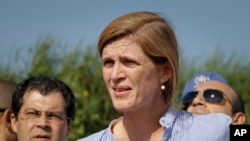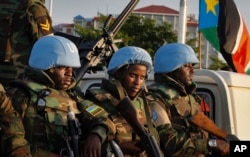The U.N. Security Council on Saturday joined with religious leaders and diplomats in South Sudan in calling on the Juba government to allow the deployment of more peacekeepers in the war-ravaged country.
The U.N. call came after visiting ambassadors from the 15-member council met with senior officials in the government of President Salva Kiir to press for the deployment of a 4,000-strong regional protection force authorized by the council last month.
The council approved the new force of African troops to augment about 17,000 U.N. peacekeepers already seeking to bring order to Africa's newest nation.
The Kiir government has so far rejected any further international deployments, saying they would violate the country's sovereignty.
The visiting U.N. envoys also toured a U.N. encampment, known as a Protection of Civilians (POC) site, where tens of thousands of civilians have languished during nearly three years of fighting between forces loyal to the government and rebels seeking to topple it.
Afterward, U.S. Ambassador Samantha Power called the Security Council visit "extremely important ... because it's our chance to see the human consequences of the failure of political leaders to bring peace back to their country."
Power said council members had heard from women who detailed "a huge surge in sexual violence against women" who leave the Juba POC site for firewood or for other family necessities.
She also said the council had heard "desperate appeals" from refugees for the quick deployment of the newly authorized protection force, and said the council had heard repeatedly that those trapped in the squalid encampments were too terrified to leave.
There has been no immediate comment from the Kiir government on the U.N. visit.
Fighting erupted in South Sudan in December 2013 when government forces loyal to Kiir began fighting rebels led by the president's former deputy, Riek Machar.
The two sides signed a peace deal in August 2015 that elevated Machar to first vice president. But the shaky accord broke apart in July, when Kiir loyalists and troops backing Machar fought in a four-day battle in Juba that killed at least 300 people and wounded hundreds more.






